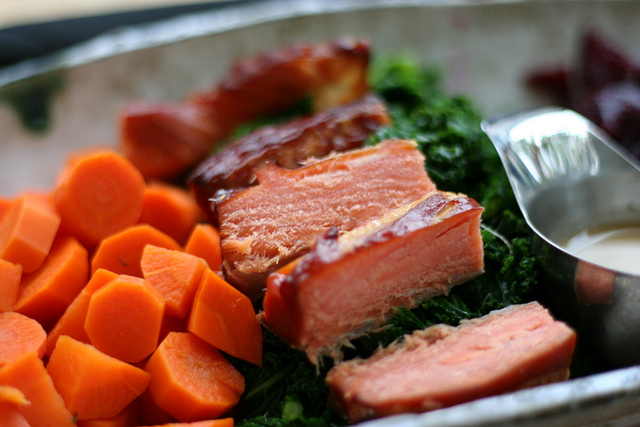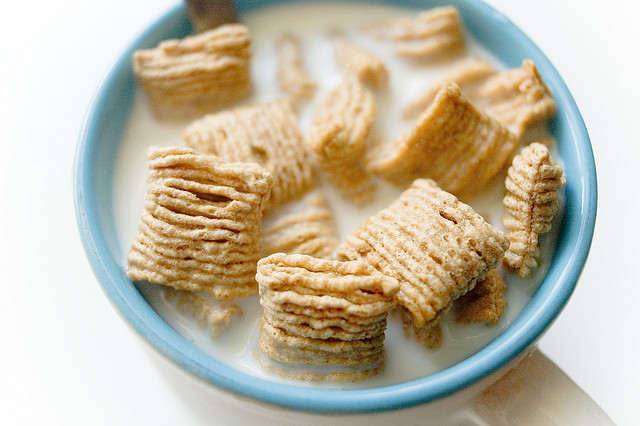Smoked salmon paleo platter. Flickr: ByteForByte
With the latest paleo diet book being pulled from the printing line after being labelled dangerous to babies and children, we look at the pros and cons of ‘going paleo’.
The premise behind the paleo diet is simple. Based on the belief we need to eschew all things processed and go back to eating as cavemen did, advocates of paleo explain you need to skip the grains (both refined and whole), legumes, packaged snacks, dairy, and sugar and usher in plenty of vegetables, fruit, meat, seafood, eggs, nuts, seeds, fats, and oils.Unfortunately there is very little scientific evidence to support this approach.
The paleo principle is not as new as many may think – it was first introduced back in the ’80s, based on the belief current day chronic metabolic disorders have resulted from a gene-culture mismatch and the human body’s inability to adapt from Palaeolithic times.
The science, however, doesn’t support this. Professor Jennie Brand-Miller of the Glycemic Index Foundation (GIF) says there is abundant evidence for widespread genetic change that occurred during the Neolithic period and the beginnings of agriculture.
We now also know that our DNA can adapt to our environment relatively quickly through what is termed epigenetic changes. So the premise of the paleo diet is scientifically flawed.
Our own Professor Manny Noakes recently talked about the paleo diet on Channel 10’s program Studio 10. She said while there is a romanticism about the diet, so far there is no research that supports it. But she said there are good things as well about the paleo diet. You can see the full interview from Studio 10 in the video below:
youtube https://www.youtube.com/watch?v=IpU8WEnlTTE
Paleo and the TWD
The paleo diet and the TWD have some elements in common – both recommend steering away from heavily processed foods, both advocate the consumption of lean meats, vegetables and fruits and they both encourage consumers to eat nuts, seeds and eggs. All up, there is a great mix of fresh wholefoods with few empty calories and a good mix of nutrients.
The difference between the two diets, and the main issue with a paleo diet is not so much about what is on the “can eat” list as much as what is on the “do not consume” list.
“The issue with Paleo is it is restrictive in a few key areas. It also makes assumptions about what early man ate that aren’t necessarily accurate and overlooks that the foods available to modern man are not the same as what the cavemen would source in the wild, and therefore may not have the same nutritional value,” says Jennie.
So what’s wrong with the paleo diet?
Jennie cautions that cutting out grains, legumes and dairy creates nutritional deficits, and removing sugar from the diet means realistically cutting out fruit.
She also says that when it comes to cereals and grains, we need to consume them for long term good health. She says they provide us with our main source of carbohydrates, fibre, protein, and they are packed with essential vitamins and minerals. Finally, they can be rich in health promoting phytonutrients when you eat the wholegrain varieties.
Low GI breakfast cereal kick-starts the metabolism for the day. Flickr: Jonathan Lin
“Studies around the world show that eating plenty of wholegrain cereals is associated with a lower risk of certain types of cancer, heart disease and type 2 diabetes. In addition, a higher fibre intake, especially from whole cereal grains, is linked to a lower risk of cancer of the large bowel, breast, stomach and mouth,” Jennie says.
But before you reach for your breakfast cereal, Jennie does caution that the low GI wholegrains are the best choices:
“The rule of thumb is the larger the particle size, the lower the GI. Think rolled oats (low GI) vs instant oats (higher GI). It’s the grinding or milling of cereals that reduces the particle size that makes it easier for water to be absorbed and enzymes to attack during digestion.”
Dairy is another food group on the paleo hit-list, and Jennie says this is inaccurate on two levels. “Firstly, the assumption that cavemen didn’t consume dairy is inaccurate. They used to eat all of a food source – so they would eat the organ meat of the animals they consumed, and the milk ducts of lactating animals. Secondly, dairy provides us with essential nutrients including calcium and should be consumed by those that can tolerate lactose.”
Trust the science
So while the paleo diet has some positive aspects, it’s important not to cut key food groups including dairy, grains and cereals – you’ll be missing out on some important nutrients essential for good health. At this time, there are very few scientific studies which have tested the paleo diet on human health. In contrast the TWD is supported by a large body of scientific evidence showing great benefits to health and wellbeing.
More about Total Wellbeing Diet online here.




5th November 2015 at 10:57 pm
Researchers are becoming lazy …..
12th April 2015 at 9:01 am
I’m sorry but I have to disagree vehemently with you. There is a host of scientific research that links gluten, grains, sugar to a host of today’s ills and ails. Let’s start with Dr Wahls who has MS. I’m eagerly awaiting her latest results. In addition, to name just a few readily available in pubmed 🙂 Plus, there’s the countless personal testimonies: http://www.nature.com/ejcn/journal/v63/n8/full/ejcn20094a.html http://www.mdpi.com/2072-6643/5/3/771/htm http://link.springer.com/article/10.1007/s12016-011-8291-x#page-1 http://link.springer.com/article/10.1007/s11882-013-0404-6#page-1 http://www.biomedcentral.com/content/pdf/1743-7075-3-39.pdf http://diabetes.diabetesjournals.org/content/33/6/596.short I could go on but I have a life to live. Knowledge is power xo
29th November 2015 at 11:52 pm
Cavemen didn’t use the internet either, nor did they have any idea what scientific research is.
based on this, I think you should stay off the internet and that this diet suits you
12th April 2015 at 6:27 am
What utter rubbish! You only have to read the results that people are getting from following this ‘diet’ to see the benefits. If cutting out grains, legumes, processed foods and sugar makes so much difference to people, why then do you ‘so called’ experts still rant on about it being dangerous?
11th April 2015 at 8:40 pm
There is ample evidence to support the elimination of other than “fruit sugars” from the diet. Please read “Sweet Poison” written by a researcher not a Dietician. We are eating processed foods with little or no nutritional value. eg. margarine. ! Paleo is not a diet. It is a way of eating nutritional foods. Please have a look at the foods being promoted to you to see what constitutes the whole package. After having a look, ask yourself, when did all these additional items come into your consumption and when did cancers and other illness start. Just eat fresh fruit and fresh vegetables and fresh grass fed meats.. That is what Paleo is saying. So stop denigrating fresh as opposed to “manufactured” We do not need manufactured foods.
11th April 2015 at 7:01 am
I see you love your grains. Tell me please, what’s in a grain that I need that I can’t get more of from a nut or a seed?
As for these adaptations – some people have persistence of a lactase gene that already existed in everybody. Others have extra copies of an amylase gene that already existed in everybody. The function of these genes hasn’t changed. I would call this the low-hanging fruit of evolution, and question why we don’t yet have adaptations that allow us to digest gliadin or A1 beta-casein properly.
Also consider what drives adapatation – death, infertility, unfitness, unattractiveness – are these things we should expose ourselves to if we can help it?
Who has the lowest incidence of lactase persistence and AMY1 copies? Non-European peoples, indigenous populations in places like the Pacific, who were never exposed to grains or milk at all until recently (and the evidence suggests neolithic man ate cheese before he ate milk). So why is the argument against Paleo based on a Eurocentric assumption, that everyone can thrive on foods only Europeans and those from a few other centres of civilisation were partly adapted to, at least before the manufacturing of products from these foods started?
The claim that the Paleo diet lacks evidence is false as there have been a number of trials of the Paleo diet showing positive results compared to conventional recommendations, and a number of other trials where incorporation of aspects of the Paleo diet into lifestyle plans was associated with benefit, as well as case studies of individual patients in whom conditions such as type 1 diabetes, type 2 diabetes, and metabolic syndrome have improved.
There are also detailed papers on the subject of what various hunter-gatherer and paleolithic populations ate. What song the Syrens sang, or what name Achilles assumed when he hid himself among women, though puzzling questions, are not beyond all conjecture, and you will find reasonable estimates of such things as an analysis of the fatty acids in mammoth carcasses, or the contents of many a Paleolithic meal, in the scientific record.
It should be quite clear to the dimmest observer what Paleolithic people could never have eaten; bread, pasta, breakfast cereal, noodles, sugar, oil, margarine, and anything with azo dyes in it, for a start. Did they eat grains? Sometimes whole grains are found at Paleolithic sites, but grains are never, so far as I know, part of modern Hunter-Gatherer diets or the traditional diet of Pacific peoples. On the other hand, modern Hunter-Gatherers sometimes get a significant portion of energy from honey without suffering from modern glycaemic diseases. There is certainly room for debate around these matters; they are points an informed person would critique.
Are these experts so busy that they do not have time to locate and read this peer-reviewed research before giving their opinion? Have they been lulled into a false sense of omniscience about a novel subject by reading a book like Paleofantasy and a few debunking blogs?
The real experts on the Paleo diet, scientists like Steffan Lindberg and Linda Frassetto, are not hard to find. The research is not hard to find either – here is a Google Scholar compendium of peer-reviewed Paleolithic diet studies http://tinyurl.com/kon7vlg
Informed critique is always welcome in the scientific community. Half-baked, patronising bluster is, I’m afraid, merely annoying. You can do better than this.